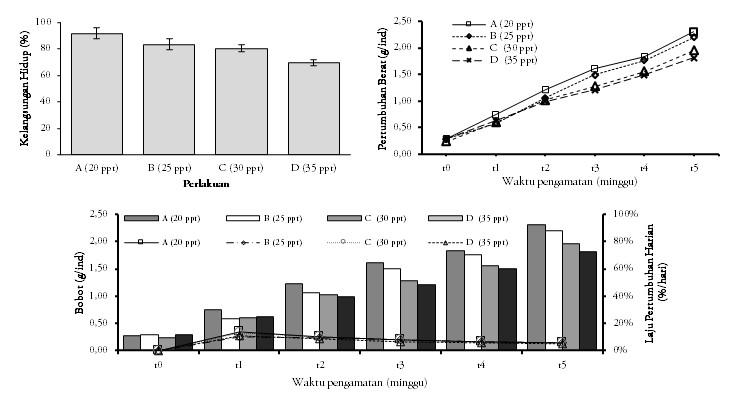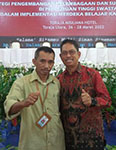Akuatikisle: Jurnal Akuakultur, Pesisir dan Pulau-Pulau Kecil
Full Length Article
Survival rate and growth of juvenile vannamei shrimp (Litopenaeus vannamei) in different media water salinity
Highlights
Generate NLP AI by Wizdam ID.
Abstract
Shrimp commodities in Indonesia have been cultivated, either traditionally, traditionally plus, semi intensive, or intensively. One type of shrimp that is constantly strived to increase its production is the shrimp vaname (Litopenaneus vannamei). The environmental conditions of pond waters are closely related to pond water quality. One of the water quality parameters affecting the survival and growth of vaname shrimp is salinity. The study was conducted from May to June 2018 at the Fish Seed Hall (BBIP) Ghonebalano, Ghonebalano Village, Duruka District, Muna Regency. This study aims to determine the effect of water salinity on different media on the survival and growth of vaname shrimp. The study used a Completely Randomized Design with four treatments and three replications. Treatment A salinity 20 ppt, B treatment salinity 25 ppt, C treatment salinity 30 ppt and treatment D salinity 35 ppt. The results showed that the treatment had significant effect on the survival of the animals in the 95% confidence level where the survival in sequence, the treatment of A 87.50%, the treatment of B 83.33%, the C treatment 80.56% and the treatment D 69.44% . The treatment also had a significant effect on the growth of test animal at 95% confidence level. Successive growth was, treatment A 2.01 g, treatment B 1.91 g, treatment C 1,71 g and treatment D 1.51 g.
Keywords
Introduction
Section snippets
Material and Methods
Materials and methods from the full-text PDF of this article cannot be displayed.
Results
Results from the full-text PDF of this article cannot be displayed.
Discussion
Discussion from the full-text PDF of this article cannot be displayed.
Conclusions
Conclusions from the full-text PDF of this article cannot be displayed.
Acknowledgment
Acknowledgment from the full-text PDF of this article cannot be displayed.
Competing interest
The authors declare that they have no known competing financial interests or personal relationships that could have appeared to influence the work reported in this paper.
Conflict of interest
The authors declare that the research was conducted in the absence of any commercial or financial relationships that could be construed as a potential conflict of interest.
Ethical approval acknowledgements
No ethical approval required for this article. All procedures followed were in accordance with the ethical standards of the responsible committee on human experimentation (institutional and national) and with the Helsinki Declaration of 1975, as revised in 2008 (5)
Supplementary files
Data sharing not applicable to this article as no datasets were generated or analysed during the current study, and/or contains supplementary material, which is available to authorized users.
References (1)
Abidin, J., 2011. Penambahan Kalsium untuk Meningkatkan Kelangsungan Hidup dan Pertumbuhan Juvenil Udang Galah (Macrobrachium rosenbergii de Man) Pada Media Bersalinitas. Sekolah Pascasarjana Institut Pertanian Bogor. Bogor Indonesia.
Ali, F., & Waluyo, A., 2015. Tingkat Kelangsungan Hidup dan Pertumbuhan Udang Galah (Macrobrachium rosenbergii De Man) pada Media Bersalinitas. Limnotek. 22(1):42–51.
Amri, K., 2003. Budidaya Udang Windu Secara Intensif. AgroMedia.
Anonim, 2016. Rencana Strategis Dinas Perikanan Kabupaten Muna Tahun 2016-2021. Dinas Perikanan Kabupaten Muna. Raha.
Asnawi, & Mukhlis, 2008. Analisis Ekspor Udang Indonesia: Suatu Pendekatan VECM. In: Prosiding International Conference on Regional Networking 2008. vol. d. Banda Aceh. pp. 27–28.
Boyd, C. E., 1982. Water quality management for pond fish culture. Elsevier Scientific Publishing Co.
Boyd, C. E., .1991. Water Quality and Aeration in Shrimp Farming, Aurbun University, Alabama. Birmingham Publishing Co. Birmingham, Alabama.
Effendie, M. I. I., 1997. Biologi Perikanan. Yayasan Pustaka Nusatama. Yogyakarta, 163 p.
Elovaara, A. K., 2003. Shrimp Farming Manual: Practical Technology for Intensive Shrimp Production. United States of America (USA)., 220 p.
Fegan, D. F., 2003. Budidaya Udang Vannamei (Litopenaeus vannamei) di Asia. Gold Coin Indonesia Specialities Jakarta.
Haliman, R. W., & Adijaya, D. S., 2005. Udang Vannamei, Pembudidayaan dan Prospek Pasar Udang Putih yang Tahan Penyakit. vol. 75, Penebar Swadaya. Jakarta.
Harefa, F., 1996. Pembudidayaan Artemia Untuk Pakan Udang dan Ikan. Penebar Swadaya. Jakarta.
Lantu, S., 2010. Osmoregulasi pada Hewan Akuatik. Jurnal Perikanan dan Kelautan. VI(1):46–50. DOI: 10.1016/j.epsl.2009.12.039.
Nengsih, E. A., 2015. Pengaruh aplikasi probiotik terhadap kualitas air dan pertumbuhan udang Litopenaeus vannamei. Jurnal Biosains. 1(1):11–16.
Saoud, I. P., Davis, D. A., & Rouse, D. B., 2003. Suitability studies of inland well waters for Litopenaeus vannamei culture. Aquaculture. 217:373–383.
Soemardjati, W., & Suriawan, A., 2007. Petunjuk teknis budidaya udang vaname (Litopenaeus vannamei) di Tambak. Departemen Kelautan dan Perikanan, Direktorat Jenderal Perikanan Budidaya. Balai Budidaya Air Payau. Situbondo.
Syukri, M., & Ilham, M., 2016. Pengaruh salinitas terhadap sintasan dan pertumbuhan larva udang windu (Penaeus monodon). Jurnal Galung Tropika. 5(2):86–96.
Tahe, S., & Nawang, A., 2012. Respon yuwana udang vanname (Litopenaeus vannamei) pada tingkat salinitas berbeda. In: Prosiding Indoaqua-Forum Inovasi Teknologi Akuakultur. pp. 77–84.
Taqwa, F. H., 2008. Pengaruh Penambahan Kalium pada Masa Adaptasi Penurunan Salinitas terhadap Performa Pascalarva Udang Vannamei (Litopenaeus vannamei). Institut Pertanian Bogor, 84 p.
Xincai, C., & Yongquan, S., 2001. Shrimp culture. China International Training Course on Technology of Marineculture (Precious Fishes). China: Yiamen Municipial Science & Technology Commission. :107–113.
Zonneveld, N., Huisman, E. A., & Boon, J. H., 1991. Prinsip-prinsip budidaya ikan. PT Gramedia Pustaka Utama.
Bibliographic Information
Cite this article as:
-
Submitted
29 July 2018 -
Revised
21 January 2019 -
Accepted
8 May 2019 -
Published
16 May 2019 -
Version of record
23 May 2019 -
Issue date
31 May 2019
-
Academic subject
Aquaculture; Fisheries Science
Keywords
Copyright
Sangia Advertisement
Copyright © 2019 Abdul Rakhfid, Erna, Rochmady, Fendi, Muhammad Zayani Ihu, Karyawati. Sangia Research Media and Publishing. Production and hosting by Sangia (SRM™).  This work is licensed under a Creative Commons Attribution-ShareAlike 4.0 International License.
This work is licensed under a Creative Commons Attribution-ShareAlike 4.0 International License.
Disclaimer: All claims expressed in this article are solely those of the authors and do not necessarily represent those of their affiliated organizations, or those of the publisher, the editors and the reviewers. Any product that may be evaluated in this article or claim that may be made by its manufacturer is not guaranteed or endorsed by the publisher.
Comments on this article
By submitting a comment you agree to abide by our Terms and Community Guidelines. If you find something abusive or that does not comply with our terms or guidelines please flag it as inappropriate.









